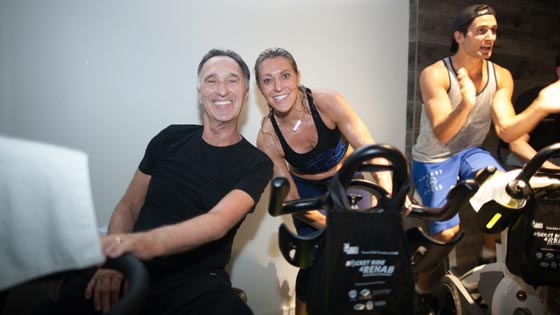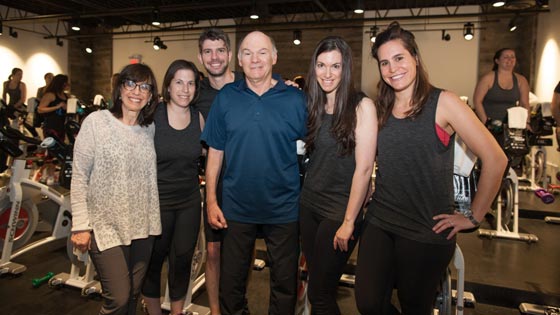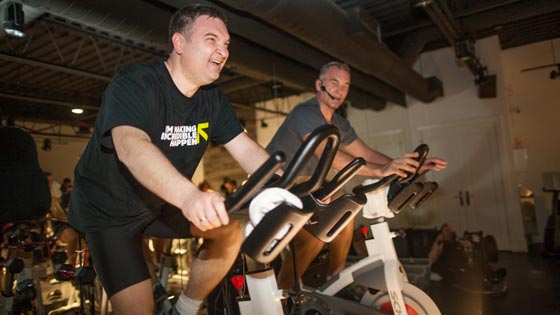
Howard Rocket (left) with daughter Dana at Toronto Rehab Foundation’s second annual Rocket Ride for Rehab. (Photo: William Suarez)
In 1995, Howard Rocket suffered a massive stroke several weeks after hitting his head during a touch football game. He survived emergency surgery but was left barely able to move or communicate.
Grateful for Toronto Rehab's life-changing care, Howard, and fellow stroke rehab patient Lara Kaufman founded Rocket Ride 4 Rehab to raise awareness and funds for The Rocket Family Upper Extremity Clinic and Stroke Rehab program.

The Goldlust family attended Rocket Ride 4 Rehab in support of Gary Goldlust (middle) who recently suffered a stroke. (Photo: William Suarez)
Upper extremity impairment following a neurological incident is significant. Each year, more than 300,000 individuals survive a stroke. Of this group, 55 to 75 per cent are estimated to have some degree of upper body impairment to the shoulder, arm, forearm, wrist, or hand. Toronto Rehab's ground-breaking Rocket Family Upper Extremity Clinic is designed to directly connect new research discoveries to patient care in order to greatly benefit individuals who live with neurological impairment after a stroke.
Howard, Lara and other stroke survivors and their families joined Toronto Rehab Foundation last Saturday at Rocket Cycle for the second annual Rocket Ride 4 Rehab, which raised close to $140,000.
Related to this story
The road to recovery: Howard's journey
Toronto Rehab helped Howard rebuild his life, teaching him to walk and communicate again through intensive rehabilitation therapy and a lot of hard work. Unfortunately, paralysis remained in his left hand and arm.
Twenty years passed without any significant improvements and Howard had lost hope that anything could help.
A new technology had recently been developed at Toronto Rehab, called Function Electrical Stimulation (FES). Howard began his FES treatment, with no expectations for recovery.

Dr. Milos Popovic, Toronto Rehab Chair in Spinal Cord Injury Research and inventor of the MyndMove FES device that helped Howard Rocket regain mobility in his left arm, helped lead a session at this year's Rocket Ride for Rehab (Photo: William Suarez)
Functional electrical stimulation (FES) uses controlled pulses of electrical current to stimulate physical or bodily functions lost through nervous system impairment. FES is applied to peripheral nerves that activate and contract specific muscles or muscle groups to evoke purposeful, patterned movement.
After only four sessions using FES therapy, Howard's clenched left hand relaxed and the pain in his shoulder subsided. Six sessions later, he started to move his arm. At the end of 20 sessions, he was able to move his arm up to his chest and regain some functional movement in his hand.
Howard continues to improve and can now perform many daily activities that most people take for granted such as wearing a glove with five fingers versus a mitten and holding his iPhone in his left hand while typing with his right.
"Toronto Rehab gave me back my life and I'm forever grateful," says Howard.
"I know Toronto Rehab will continue to push the boundaries and discover more incredible ways to help stroke survivors."
Learn more about Rocket Ride 4 Rehab.
